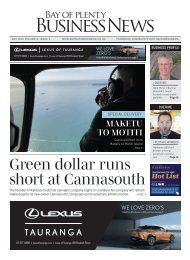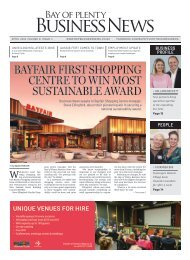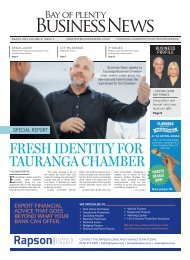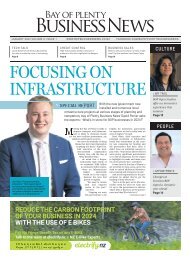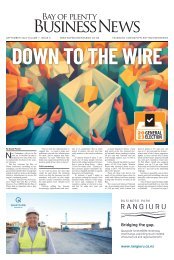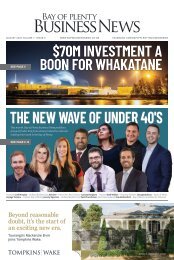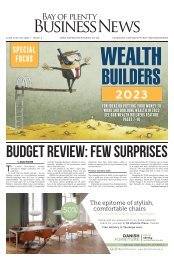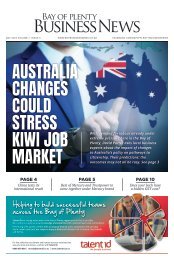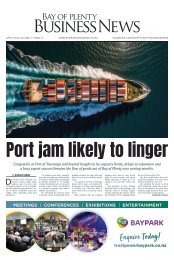Create successful ePaper yourself
Turn your PDF publications into a flip-book with our unique Google optimized e-Paper software.
SCION<br />
Driving forestry tech<br />
innovation and growth<br />
NESTLED ON THE<br />
EDGE OF the<br />
Whakarewarewa<br />
Forest is one of<br />
Rotorua’s largest<br />
employers, quietly<br />
going about the<br />
business of developing some of New<br />
Zealand’s most innovative technologies<br />
for the forestry, wood products and<br />
biomaterials industries.<br />
Scion may be tucked out of sight,<br />
but that is soon to change with the<br />
imminent opening of its showcase<br />
innovation hub. As one of seven Crown<br />
research institutes, Scion’s job is to drive<br />
innovation and growth from the forestry,<br />
wood products and biomaterials sectors<br />
to build economic value and contribute<br />
environmental and social benefits for<br />
New Zealand.<br />
“We sit on the world stage when it<br />
comes to scientific endeavour,” says<br />
Scion CEO Dr Julian Elder.<br />
“When we open our innovation<br />
hub doors to the public we want to<br />
excite and educate people about the<br />
possibilities for the future from forests<br />
and wood, and we want to show how<br />
Scion is creating solutions to some of the<br />
world’s big challenges.”<br />
Forestry key to a low-carbon world<br />
Planted forests are an important<br />
worldwide resource that can provide<br />
solutions to many global problems such<br />
as rising greenhouse gas emissions,<br />
access to clean water, unsustainable<br />
land use and dependence on finite<br />
fossil fuels. Forestry is recognised<br />
globally as a key part of a low-carbon,<br />
biobased economy. In shorthand this is<br />
a ‘bioeconomy’ and a well-established<br />
concept in many nations.<br />
A bioeconomy uses renewable<br />
resources like forests in the manufacture<br />
of new products and energy, and when<br />
the waste from one process becomes<br />
the input into another process, a cycle is<br />
created.<br />
Scion’s strategic goal is quite clear –<br />
transitioning New Zealand to a circular<br />
bioeconomy. The institute works closely<br />
with industry, government and Māori on<br />
research programmes that lead to this<br />
goal, and it is making good progress.<br />
Among exciting examples that<br />
Scion is leading are bark biorefinery<br />
technologies that can convert millions<br />
of tonnes of bark into high value<br />
materials and products (like tannins<br />
that can be chemically modified for<br />
many applications and water-repelling<br />
polymers); a national roadmap for the<br />
future of bioplastics; a biofuels roadmap<br />
for New Zealand; and biobased additive<br />
SCION’S INNOVATION HUB IS<br />
NEAR COMPLETION.<br />
46 | YEAR BOOK <strong>2020</strong>



